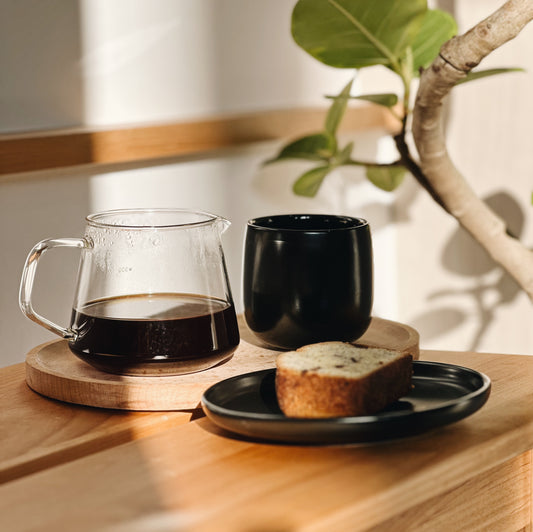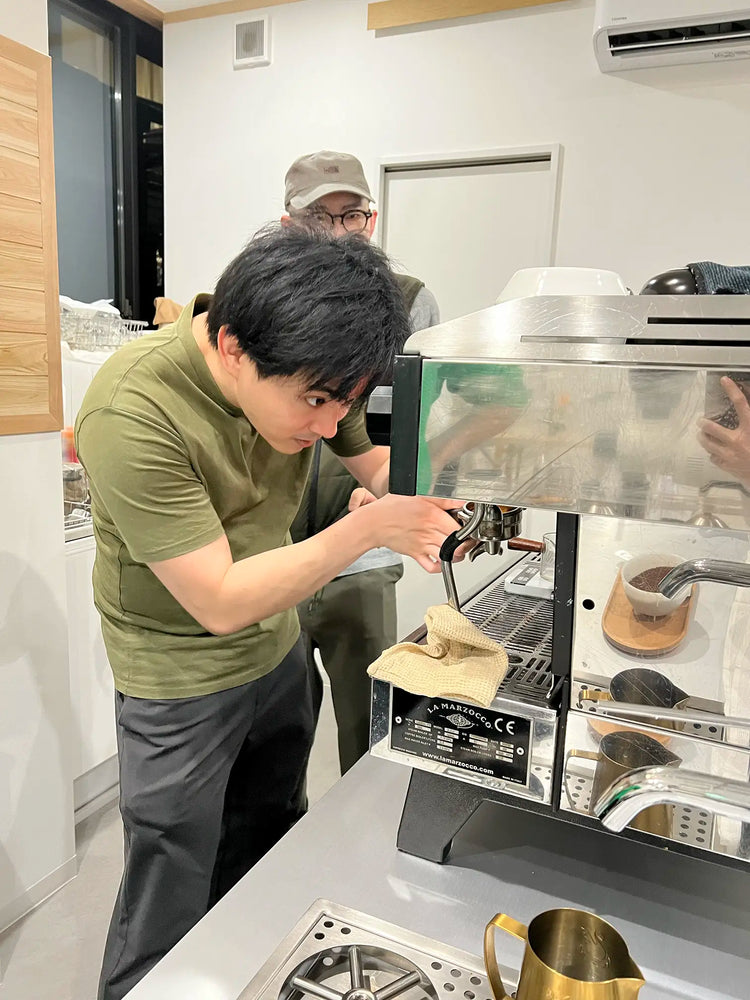商品の特長
ご不明点がありましたら hello@tasse-coffee.jp までご連絡ください。できるだけ早く(1日以内を目安に)ご返信いたします。
説明
もっと
閉じる
もっと
閉じる
この革新的な1日集中コースは、エスプレッソ抽出の科学を徹底的に掘り下げ、伝統的な常識に疑問を投げかけながら、データに基づいて変数を操り、理想の一杯を生み出す力を養います。主観的だった抽出を客観的にコントロールできるようになる、実践的かつデータドリブンな学びの旅。エスプレッソスキルを本気で高めたい方に最適なプログラムです。
-
対象者:
- エスプレッソマシンを所有し、基本レシピ以上のテクニックを磨きたい経験豊富なホームバリスタ。
- カフェ現場での一貫性向上とイノベーションのために、より高度な科学的知見を求めるプロフェッショナルバリスタの方。
- 経験則にとらわれず、エスプレッソの物理・化学・官能評価を深く理解したいコーヒー愛好家やホビイストの方。
- 焙煎士やトレーナー、独学で学ぶ方など、抽出のメカニズム、不均一な流れ、フレーバー最適化の仕組みを本質から理解したい、コーヒーサイエンスに情熱を持つ方。
- レバー式やポンプ式などのエスプレッソマシンで抽出経験があり、個人またはプロとしての成長のために、実験的かつデータロギングを重視したマインドセットを取り入れたい方。
-
コース形式と運営について:
- 所要時間:1日(通常スケジュール:10:00〜17:00、休憩・ランチ含む)
- プライベート開催:日程は直接ご相談のうえ決定。1セッション最大4名までの少人数制で、きめ細かなハンズオン指導を行います。
- 料金:お一人様 80,000円(機材使用料、配布資料、データログ用テンプレートを含む)
-
コースモジュール概要 :
-
モジュール1:エスプレッソサイエンスの基礎と応用理論:
- 説明:このモジュールでは、まずインタラクティブな講義を通じて、エスプレッソにまつわる一般的な「神話」(例:25〜30秒抽出や9バール固定が「理想」とされる考え方)を検証します。視覚資料を用いて、「圧力=流量×抵抗」という圧力・流量・抵抗の関係、パック内で起こるダイナミクス(CO2の放出や可溶成分の拡散など)、揮発性有機化合物(VOC)の化学など、コアとなる概念を解説します。さらに、基礎的な指標とその計算方法を紹介し、「ベストプラクティス」を批判的に捉えるオープンなディスカッションを促します。
- 学べる内容:参加者はエスプレッソの物理と化学を体系的に理解し、抽出中にレジスタンス(抵抗)が低下する理由(ドーズロス、CO2、拡散によるもの)や、不均一抽出が官能評価に与える影響(例:外側の酸っぱさ=アンダー抽出、中心部の苦味=オーバー抽出)を説明できるようになります。さらに、TDS(Total Dissolved Solids:濃度)、EY(Extraction Yield:抽出効率)、TCF(Time to Cover Filter:プレインフュージョン時間)といった主要指標の定義と活用法、および7つの官能指標(シャープ、リッチ、シロップ/マウスフィール、スイート、サワー、ビター、アフターテイスト)を用いた客観的評価を習得します。期待される成果:受講者は経験則に頼った抽出からデータドリブンな思考へとシフトし、自身の抽出プロセスを批判的に分析できるようになります。
-
モジュール2:高度なプレショット&ショット準備:
- 説明:講義に加え、デモンストレーションとグループ実習を組み合わせたモジュールで、スパイシーグラインディング(豆を60℃まで電子レンジで温めて均一に挽く手法)、ふるい分けによる粒度レイヤリング(例:細挽き-粗挽き-細挽きのスタッカート)、フィルターの活用、WDT(Weiss Distribution Technique)による粉の均一分布、約3ポンド程度の低圧タンピングによる過圧縮の回避など、先進的なテクニックを扱います。受講者は各種変数を詳細に記録し、抽出後のパックを撮影します。
- 学べる内容:受講者は、ショット品質の80%を左右するプレショット要因を習得します。具体的には、グラインド時の温度管理が微粉と苦味を抑えること、レイヤリングがチャネリングや「ドーナツ効果」を最小限にすること、フィルターがパックの一体性を保つことなどを理解します。また、ガス抜きを早めるための湿度処理の科学的背景や、低いタンピング圧でも(低い力で80%の圧縮が得られるため)十分である理由も学びます。期待される成果として、受講者は(異なる焙煎度を用いたSplit Roast Staccatoなど)高度なパックを安定して作成し、均一性の向上を記録し、日々の抽出でより豊かなマウスフィールとバランスを実現できるようになります。
-
モジュール3:抽出ショット - アドバンスドテクニック:
- 説明:実践性の高いセッションとして、レバー式を含むエスプレッソマシンをローテーションで使用し、TCFベースのプレインフュージョン(TCFの3倍時間を目標)、プレッシャープロファイリング/パルシング(抽出中盤にミニ・プレインフュージョンを入れてパック劣化を抑える)、SOUPメソッド(粗挽き・1バールの低圧で、フィルターコーヒーのような透明感を持つ高速の「ガッシャー」フローを実現)といったダイナミックな抽出手法に焦点を当てます。フローロギングスケールやビデオ録画からのライブデータにより、その場でフィードバックを行います。
- 受講者は、リアルタイムで観察・調整するスキルを身につけ、水温が焙煎度にどのように影響するか(例:ダークローストでは酸味を抑えるため高めに設定)、マニュアルマシンでのパルス抽出がどのように抽出を維持するか、SOUPが最小限の圧力で高い抽出率を実現し、優れた甘さと透明感を生み出す仕組み(「流速が速いのは悪い」という通説への挑戦)をマスターします。期待される成果:受講者は、安定したフローグラフやパック全体の十分な飽和など、目標とする指標に基づいて自信を持ってショットを落とせるようになり、マシンや焙煎度の違いに応じて技術を柔軟に適用し、プロフェッショナルレベルのコントロールを実現できるようになります。
-
モジュール4:抽出後の分析とブラッシュアップ:
- 説明:まず抽出分析ツールに関するレクチャーを行い、その後ハンズオンでの実践に移ります。屈折計を用いてTDS/EYを測定し、コントロールチャートにプロット(例:「Intenso」ゾーンを目標にTDS/EY 18%以上を狙う)、チャネリング確認のための動画レビュー(「タイガーストライプ」が良いサインだという誤解を解く)、使用後のパックを写真とgTDS(粉のTDSによる空間マッピング)で分析し、最適な飲用方法(かき混ぜる、45〜50℃まで待つ など)を踏まえたブラインドテイスティングをガイド付きで行います。
- 学習内容:受講者は、効率と結びつけた抽出率(EY)の計算などの厳密な定量分析や、隠れたムラを可視化するgTDSなどの定性分析を学び、データと官能評価(例:揮発性有機化合物〈VOC〉のバランスが悪いと、高い抽出率でも好ましい風味にならない場合がある)を関連づけて理解します。証拠に基づいて抽出技術を洗練させ、チャネリングは完全には避けられないが最小化できる現象として捉えます。期待される成果:参加者は、酸味が強い場合に収率を上げて調整するなど、エスプレッソショットのトラブルシューティングができるようになり、見た目やデータを読み解いて改善点を見つけ、バランスが取れた風味豊かなエスプレッソのための官能的な識別能力を高めます。
-
モジュール5:コースのまとめと今後の探求:
- 説明:ファシリテーターによる振り返りディスカッションの後、「パーフェクト・エスプレッソ・チャレンジ」(Intenso EY や高い Syrup スコアなどの目標を達成するため、すべての技術を統合)を実施し、データログを提出。さらに、今後の個人的な実験、機材アップグレード、エスプレッソのイノベーションの未来について前向きに語り合います。
- 学習内容:受講者は、これまでの知識を統合的なアプローチとして整理し、神話から科学への変遷を言語化しながら、データに基づく自宅での実験計画(ログ用アプリの活用など)を立てます。常に問い続け、試行錯誤を重ねるという哲学を身につけることを目指します。期待される成果:受講者は、リファレンスとして使える包括的なデータログと、継続的な習熟のためのロードマップ、そしてコースの枠を超えてイノベーションを起こし、常に「ベストショット」を再現できるマインドセットを身につけて修了します。
-
モジュール1:エスプレッソサイエンスの基礎と応用理論:
-
コース全体のメリットと到達目標:
- 全体的な変革:コース修了時には、エスプレッソに関する深い科学的理解を身につけ、あらゆる変数を分析・操作・革新して、測定可能な改善につなげられるようになります。
- 身につく主なスキル:客観的な意思決定のためのデータ記録と分析、均一抽出とフレーバー最適化のための高度なテクニック、「ベストプラクティス」にとらわれず自分なりに検証する実験的マインドセット。
- 独自の価値:1日完結型としては最も高度な本コースは、まるで錬金術のような発想力と革新性を育みます。シロップのようなとろみのある質感から、バランスのとれた甘さまで、比類ないエスプレッソクオリティを実現したい方に最適です。ご自宅での一杯を極めたい方から、プロとしての腕を磨きたい方、コーヒーへの情熱をさらに深めたい方まで、幅広くおすすめできます。
- コース後サポート:修了証の発行に加え、テンプレートや追加資料をまとめた共有デジタルフォルダへのアクセスをご提供します。
説明
この革新的な1日集中コースは、エスプレッソ抽出の科学を徹底的に掘り下げ、伝統的な常識に疑問を投げかけながら、データに基づいて変数を操り、理想の一杯を生み出す力を養います。主観的だった抽出を客観的にコントロールできるようになる、実践的かつデータドリブンな学びの旅。エスプレッソスキルを本気で高めたい方に最適なプログラムです。
-
対象者:
- エスプレッソマシンを所有し、基本レシピ以上のテクニックを磨きたい経験豊富なホームバリスタ。
- カフェ現場での一貫性向上とイノベーションのために、より高度な科学的知見を求めるプロフェッショナルバリスタの方。
- 経験則にとらわれず、エスプレッソの物理・化学・官能評価を深く理解したいコーヒー愛好家やホビイストの方。
- 焙煎士やトレーナー、独学で学ぶ方など、抽出のメカニズム、不均一な流れ、フレーバー最適化の仕組みを本質から理解したい、コーヒーサイエンスに情熱を持つ方。
- レバー式やポンプ式などのエスプレッソマシンで抽出経験があり、個人またはプロとしての成長のために、実験的かつデータロギングを重視したマインドセットを取り入れたい方。
-
コース形式と運営について:
- 所要時間:1日(通常スケジュール:10:00〜17:00、休憩・ランチ含む)
- プライベート開催:日程は直接ご相談のうえ決定。1セッション最大4名までの少人数制で、きめ細かなハンズオン指導を行います。
- 料金:お一人様 80,000円(機材使用料、配布資料、データログ用テンプレートを含む)
-
コースモジュール概要 :
-
モジュール1:エスプレッソサイエンスの基礎と応用理論:
- 説明:このモジュールでは、まずインタラクティブな講義を通じて、エスプレッソにまつわる一般的な「神話」(例:25〜30秒抽出や9バール固定が「理想」とされる考え方)を検証します。視覚資料を用いて、「圧力=流量×抵抗」という圧力・流量・抵抗の関係、パック内で起こるダイナミクス(CO2の放出や可溶成分の拡散など)、揮発性有機化合物(VOC)の化学など、コアとなる概念を解説します。さらに、基礎的な指標とその計算方法を紹介し、「ベストプラクティス」を批判的に捉えるオープンなディスカッションを促します。
- 学べる内容:参加者はエスプレッソの物理と化学を体系的に理解し、抽出中にレジスタンス(抵抗)が低下する理由(ドーズロス、CO2、拡散によるもの)や、不均一抽出が官能評価に与える影響(例:外側の酸っぱさ=アンダー抽出、中心部の苦味=オーバー抽出)を説明できるようになります。さらに、TDS(Total Dissolved Solids:濃度)、EY(Extraction Yield:抽出効率)、TCF(Time to Cover Filter:プレインフュージョン時間)といった主要指標の定義と活用法、および7つの官能指標(シャープ、リッチ、シロップ/マウスフィール、スイート、サワー、ビター、アフターテイスト)を用いた客観的評価を習得します。期待される成果:受講者は経験則に頼った抽出からデータドリブンな思考へとシフトし、自身の抽出プロセスを批判的に分析できるようになります。
-
モジュール2:高度なプレショット&ショット準備:
- 説明:講義に加え、デモンストレーションとグループ実習を組み合わせたモジュールで、スパイシーグラインディング(豆を60℃まで電子レンジで温めて均一に挽く手法)、ふるい分けによる粒度レイヤリング(例:細挽き-粗挽き-細挽きのスタッカート)、フィルターの活用、WDT(Weiss Distribution Technique)による粉の均一分布、約3ポンド程度の低圧タンピングによる過圧縮の回避など、先進的なテクニックを扱います。受講者は各種変数を詳細に記録し、抽出後のパックを撮影します。
- 学べる内容:受講者は、ショット品質の80%を左右するプレショット要因を習得します。具体的には、グラインド時の温度管理が微粉と苦味を抑えること、レイヤリングがチャネリングや「ドーナツ効果」を最小限にすること、フィルターがパックの一体性を保つことなどを理解します。また、ガス抜きを早めるための湿度処理の科学的背景や、低いタンピング圧でも(低い力で80%の圧縮が得られるため)十分である理由も学びます。期待される成果として、受講者は(異なる焙煎度を用いたSplit Roast Staccatoなど)高度なパックを安定して作成し、均一性の向上を記録し、日々の抽出でより豊かなマウスフィールとバランスを実現できるようになります。
-
モジュール3:抽出ショット - アドバンスドテクニック:
- 説明:実践性の高いセッションとして、レバー式を含むエスプレッソマシンをローテーションで使用し、TCFベースのプレインフュージョン(TCFの3倍時間を目標)、プレッシャープロファイリング/パルシング(抽出中盤にミニ・プレインフュージョンを入れてパック劣化を抑える)、SOUPメソッド(粗挽き・1バールの低圧で、フィルターコーヒーのような透明感を持つ高速の「ガッシャー」フローを実現)といったダイナミックな抽出手法に焦点を当てます。フローロギングスケールやビデオ録画からのライブデータにより、その場でフィードバックを行います。
- 受講者は、リアルタイムで観察・調整するスキルを身につけ、水温が焙煎度にどのように影響するか(例:ダークローストでは酸味を抑えるため高めに設定)、マニュアルマシンでのパルス抽出がどのように抽出を維持するか、SOUPが最小限の圧力で高い抽出率を実現し、優れた甘さと透明感を生み出す仕組み(「流速が速いのは悪い」という通説への挑戦)をマスターします。期待される成果:受講者は、安定したフローグラフやパック全体の十分な飽和など、目標とする指標に基づいて自信を持ってショットを落とせるようになり、マシンや焙煎度の違いに応じて技術を柔軟に適用し、プロフェッショナルレベルのコントロールを実現できるようになります。
-
モジュール4:抽出後の分析とブラッシュアップ:
- 説明:まず抽出分析ツールに関するレクチャーを行い、その後ハンズオンでの実践に移ります。屈折計を用いてTDS/EYを測定し、コントロールチャートにプロット(例:「Intenso」ゾーンを目標にTDS/EY 18%以上を狙う)、チャネリング確認のための動画レビュー(「タイガーストライプ」が良いサインだという誤解を解く)、使用後のパックを写真とgTDS(粉のTDSによる空間マッピング)で分析し、最適な飲用方法(かき混ぜる、45〜50℃まで待つ など)を踏まえたブラインドテイスティングをガイド付きで行います。
- 学習内容:受講者は、効率と結びつけた抽出率(EY)の計算などの厳密な定量分析や、隠れたムラを可視化するgTDSなどの定性分析を学び、データと官能評価(例:揮発性有機化合物〈VOC〉のバランスが悪いと、高い抽出率でも好ましい風味にならない場合がある)を関連づけて理解します。証拠に基づいて抽出技術を洗練させ、チャネリングは完全には避けられないが最小化できる現象として捉えます。期待される成果:参加者は、酸味が強い場合に収率を上げて調整するなど、エスプレッソショットのトラブルシューティングができるようになり、見た目やデータを読み解いて改善点を見つけ、バランスが取れた風味豊かなエスプレッソのための官能的な識別能力を高めます。
-
モジュール5:コースのまとめと今後の探求:
- 説明:ファシリテーターによる振り返りディスカッションの後、「パーフェクト・エスプレッソ・チャレンジ」(Intenso EY や高い Syrup スコアなどの目標を達成するため、すべての技術を統合)を実施し、データログを提出。さらに、今後の個人的な実験、機材アップグレード、エスプレッソのイノベーションの未来について前向きに語り合います。
- 学習内容:受講者は、これまでの知識を統合的なアプローチとして整理し、神話から科学への変遷を言語化しながら、データに基づく自宅での実験計画(ログ用アプリの活用など)を立てます。常に問い続け、試行錯誤を重ねるという哲学を身につけることを目指します。期待される成果:受講者は、リファレンスとして使える包括的なデータログと、継続的な習熟のためのロードマップ、そしてコースの枠を超えてイノベーションを起こし、常に「ベストショット」を再現できるマインドセットを身につけて修了します。
-
モジュール1:エスプレッソサイエンスの基礎と応用理論:
-
コース全体のメリットと到達目標:
- 全体的な変革:コース修了時には、エスプレッソに関する深い科学的理解を身につけ、あらゆる変数を分析・操作・革新して、測定可能な改善につなげられるようになります。
- 身につく主なスキル:客観的な意思決定のためのデータ記録と分析、均一抽出とフレーバー最適化のための高度なテクニック、「ベストプラクティス」にとらわれず自分なりに検証する実験的マインドセット。
- 独自の価値:1日完結型としては最も高度な本コースは、まるで錬金術のような発想力と革新性を育みます。シロップのようなとろみのある質感から、バランスのとれた甘さまで、比類ないエスプレッソクオリティを実現したい方に最適です。ご自宅での一杯を極めたい方から、プロとしての腕を磨きたい方、コーヒーへの情熱をさらに深めたい方まで、幅広くおすすめできます。
- コース後サポート:修了証の発行に加え、テンプレートや追加資料をまとめた共有デジタルフォルダへのアクセスをご提供します。
こちらもおすすめ













